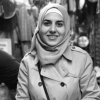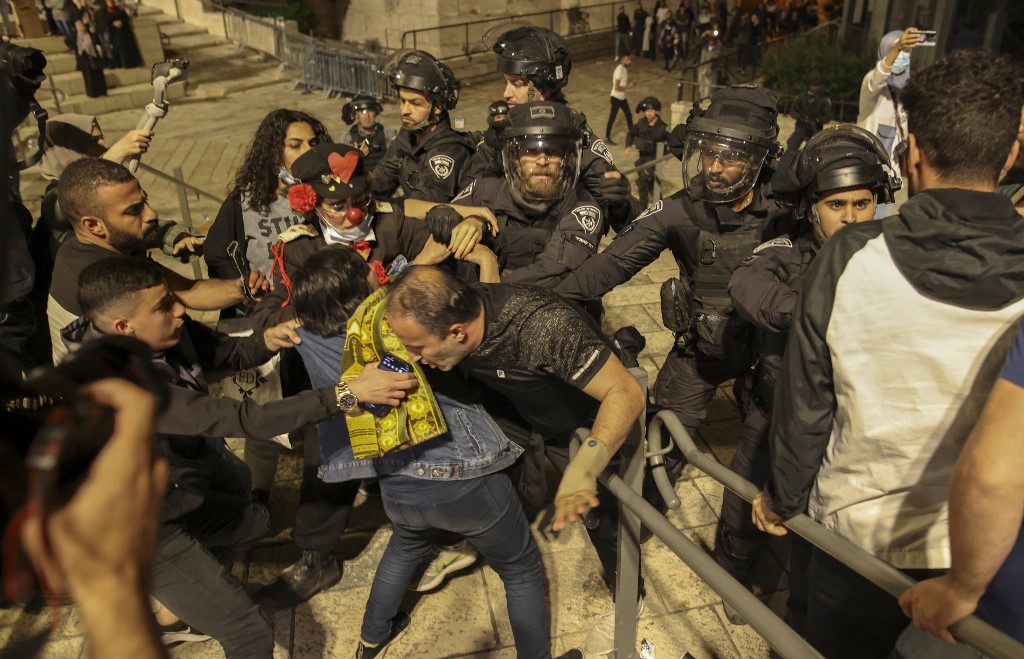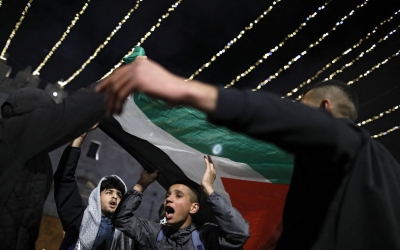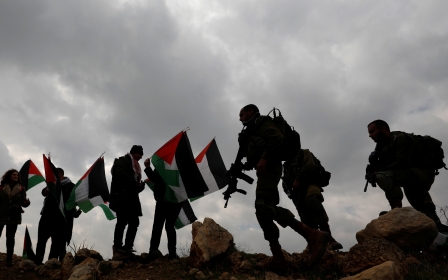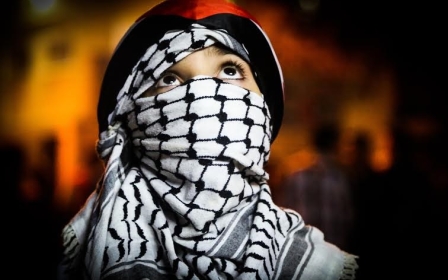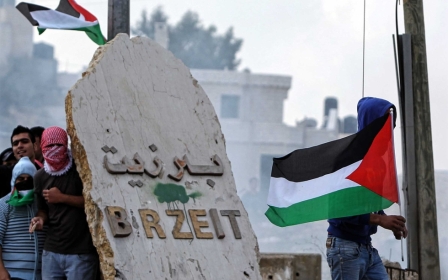The battle for Jerusalem's Damascus Gate offers a rare beacon of hope
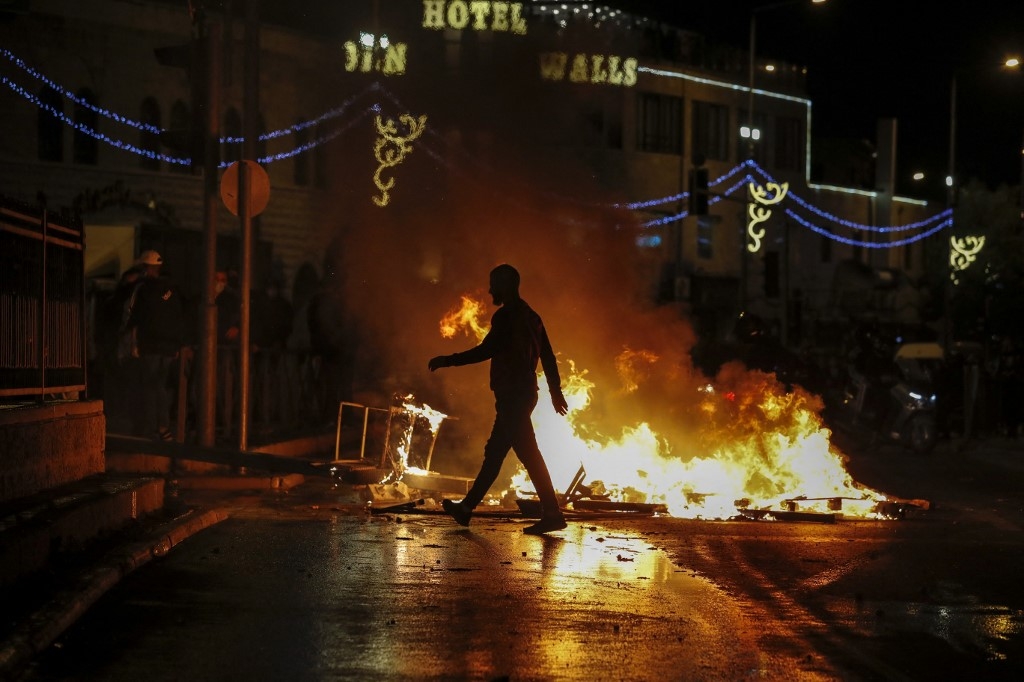
As Ramadan began this month, Palestinians heading towards the Old City found the plaza in Damascus Gate blocked by metal barriers. The barricades had been erected by Israeli occupation forces to prevent Palestinian youths from gathering on the steps of the gate, where they are accustomed to spending the long Ramadan nights.
The installation of these impediments sparked the latest round of confrontations between Israeli forces and Palestinian youths over the gateway to the Old City.
On 25 April, after nearly a fortnight of escalating clashes, Israeli occupation forces withdrew from Damascus Gate, and Palestinians raucously removed the barricades. The jubilant cheers and chants accompanying this moment invoked a similarly iconic episode of reclamation. On 28 July 2017, thousands of Palestinians marched into Al-Aqsa Mosque after two weeks of popular protests had pressured Israel into removing metal detectors at the compound’s entrances.
Israel has aimed to abolish the status of Jerusalem as an urban, unifying centre for all Palestinians
The latest wave of confrontations started with hundreds of Palestinian youths spontaneously gathering in the vicinity of the closed plaza, in defiance of Israeli restrictions. Their mere presence rattled Israeli forces, who sought to turn the whole area into a pathway where gathering was forbidden. Amid this increased repression, the youths responded by hurling stones and fireworks at Israeli forces.
On 22 April, Israeli settler groups convened a nationalist march to Damascus Gate, adding fuel to the already raging fire. The confrontations expanded beyond the Damascus Gate area, reaching other Jerusalem neighbourhoods and villages.
New MEE newsletter: Jerusalem Dispatch
Sign up to get the latest insights and analysis on Israel-Palestine, alongside Turkey Unpacked and other MEE newsletters
Youthful fearlessness
Most of the protagonists in this latest round of confrontations are young Palestinians, many without prior experience in political action. Their youthful fearlessness has been reflected in their reaction to Israeli repression, including smashing police cars, attacking surveillance cameras and chasing settlers. Dozens have been arrested or injured.
Three interlinked factors can help us trace the path that led to this latest conflagration: people’s bond to Damascus Gate, settler assaults against Palestinians, and an entrenched process of “social engineering” by Israeli authorities targeting the city’s Palestinian youth.
Preserving the right to sit on the steps of Damascus Gate has underlined this round of clashes. People have successfully reclaimed the plaza as a Palestinian and Arab space during the last decade, with this reclamation rooted in a series of vigils and protests, alongside political, social and cultural activities.
In 2015, Damascus Gate turned into a flashpoint for direct confrontations between Israeli forces and Palestinian youths in the wake of the October uprising, when several Palestinians were shot by Israeli forces after stabbing incidents.
Since then, Israeli authorities have initiated a quest to re-impose their hegemony over Damascus Gate. They have used repressive measures, such as humiliating searches of Palestinian youths, blocking people from sitting on the steps, installing surveillance cameras, maintaining a heavy police presence and constructing three watchtowers.
The quest to militarise Damascus Gate and erase its Palestinian identity reached new heights with last year’s decision by the Jerusalem municipality to name the gate's steps after two Israeli border police officers killed in 2016 and 2017.
Social fragmentation
While such measures cannot expunge the area's Palestinian history or quash the Palestinian reclamation movement, they seek to impede its transformation into a mobilising force capable of opposing the destruction of the city’s social fabric.
Since the city’s occupation and annexation, Israel has aimed to abolish the status of Jerusalem as an urban, unifying centre for all Palestinians by isolating it from West Bank communities and surrounding it with checkpoints and the separation wall. Israel has also sought to isolate Jerusalemites across neighbourhoods fragmented by settlements and settler roads. The Palestinian reclamation movement at Damascus Gate turns the table on such policies of division, which is why Israel has become fixated with controlling the space.
The second factor fuelling this round of clashes is the aggression of Israeli settlers, who are a proxy of the occupying power - but unlike the state and its actors, they are unrestrained by diplomatic considerations and indifferent to international media reports. Attacks by Israeli settlers against Palestinians have become routine, and while most are not captured by the media, those that are provide ample evidence of the deep-seated, anti-Palestinian hatred motivating them.
The current wave of confrontations and the accompanying Israeli repression cannot be divorced from the broader context of growing colonial aggression in Jerusalem, which has become ever more brazen during the last few years.
Jerusalem receives the full might of Israel's state apparatus, headed by the government, implemented by security services and supported by Israeli community centres, which seek to co-opt Palestinian youths. The city is also preyed upon by a local elite of businessmen concerned only with their own interests.
Policies of containment
Direct and naked Israeli repression is complemented by a less obvious form, based on policies of discipline and containment. Among the aggressive tools are home demolitions, including forcing Palestinians to tear down their own homes to avoid paying demolition costs. Israeli authorities also regularly arrest or expel Palestinian activists, prohibit Palestinian political or social organising, target Palestinian commerce and assault worshippers at Al-Aqsa Mosque.
When it comes to policies of assimilation or “soft” repression, Israel allocates a considerable chunk of its budget towards depoliticising the Palestinian presence in the city.
We need a national vision that goes beyond slogans and empty rhetoric
In recent years, Israeli public and private institutions have established branches in Palestinian neighbourhoods to entrench Israeli control over Palestinian lives. Under the pretext of protecting public health, Israeli authorities have also exploited the Covid-19 pandemic to strengthen the presence of Israeli forces in Palestinian neighbourhoods.
The recent escalation of aggressive measures in Jerusalem reflects Israel’s objective of cementing its sovereignty over all of Jerusalem and rejecting any notion of dividing the city. Amid this backdrop, the scenes coming from Damascus Gate are a rare beacon of hope. A new generation of Palestinians targeted by a complex colonial system has emerged to lead the way, oblivious to the precautions traditionally taken by Palestinian protesters.
This necessitates further reflection on possible ways to save the city and to support its people in the face of potential Israeli reprisals. We need a national vision that goes beyond slogans and empty rhetoric. As for questions over the lack of political consciousness among the youth participating in these confrontations, one should recall that it is in the course of such confrontations that consciousness is created and crystallised.
This is an abridged version of an article originally published in Arabic by Metras.
The views expressed in this article belong to the author and do not necessarily reflect the editorial policy of Middle East Eye.
Middle East Eye delivers independent and unrivalled coverage and analysis of the Middle East, North Africa and beyond. To learn more about republishing this content and the associated fees, please fill out this form. More about MEE can be found here.


